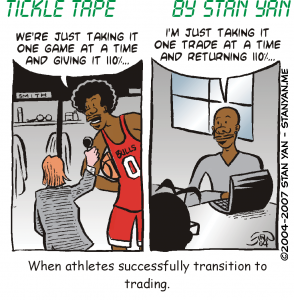Jason has been holding a position in Dell Computer for the past month. It’s been doing well so far, and earnings forecasts suggest profits, in part due to sales in new markets. On the other hand, economic figures seem grim. The business news is full of stories of company cutbacks, which can easily suggest lower sales for new computers. Jason is stuck in a quandary. He’s proud of his decision to buy Dell, and he’s hoping to make a profitable trade, but he wonders, “Am I trading on the news? Am I listening to the media and ignoring other more important economic indicators? Should I sell now or hold it a little longer?”
He wants to make a profit, but on the other hand, he doesn’t want his winning position to turn into a loser. It’s one thing to make a wrong guess upon opening a position, it’s quite another to let a winning trade turn into a loser. Inaction is a major cause of regret. Rather than face that possible regret, why not just sell now, lock in the profits and feel pride?
The interplay between regret and pride influences many investment decisions. On the one hand, people prefer to experience the pride, and bask in the glory of a winning trade, but on the other hand, “they need to let their winning trades run.” Letting a winning trade run is hard to do. It’s possible that it will turn around, and the inaction of holding the position may cause regret later.
According to behavioural economists, regret and pride are the two most pervasive and powerful emotions when it comes to investment decisions. Traders and investors seek out pride and avoid regret. Pride is experienced when we have accomplished an important goal. It results in a feeling of extreme pleasure. Regret occurs when we have made a poor decision.
According to behavioural economists, the need for pride and avoidance of regret work together to make traders and investors prematurely sell off winning positions and hold losers unnecessarily. Here’s how it works. Selling a loser forces investors to acknowledge that their trading plan was flawed. Instead of feeling pride, they feel ashamed, which is an unpleasant emotion. It’s hard to face regret from making a bad decision, so such a decision is put off.
By leaving the losses on paper, the feelings of shame and regret are avoided. On the other hand, selling a winning position allows for bragging rights. A person can feel the pride of making a big win and bask in the glory of a good trade. What’s wrong with this strategy? A study by Dr Terrance Odean shows that winning positions are likely to remain winning positions. If a trader could hold onto the winning position, then it would have made additional profits.
By selling it early, to feel a sense of pride, the investor feels good at the expense of a greater profit. In addition, since the position is usually held less than one year, capital gains taxes must be paid. Selling losing positions would be a much wiser move. Losing positions tend to lose additional funds in the future, and there are tax advantages for doing so. Do let regret and pride get the best of you. Sell your losers and keep your winners.


